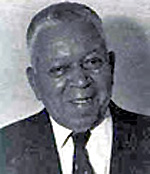Charles Edward Anderson was born on a farm in University City, near St. Louis, Missouri on August 13, 1919. He graduated as valedictorian from Sumner High School in 1937. He received a Bachelor of Science from Lincoln University, Jefferson City, Missouri in 1941. He was Certified in Meteorology (master’s degree) from the University of Chicago in 1943. Charles Anderson also earned a Master of Science inChemistry in 1948 from the Polytechnic Institute of Brooklyn, New York. In 1960, Mr. Anderson earned a Ph.D. in Meteorology from Massachusetts Institute of Technology, Boston, Massachusetts.
Charles Edward Anderson was the first African American to earn a Ph.D. in Meteorology. Dr. Anderson worked at the Chief Cloud Physics Branch at the Air Force Cambridge Research Center, Massachusetts from 1948 to 1961. He served as a captain in the Army Air Forces in World War II and was the weather officer for the Tuskegee Airmen regiment, Tuskegee, Alabama. From 1961-65, Dr. Anderson worked at the Atmospheric Science Branch of Douglas Aircraft Company, California. He served as Director of the Office of Federal Coordination in Meteorology in the Environmental Science Service Administration of the U.S. Department of Commerce, from 1965 to 1966. From 1967 to 1969, Charles Anderson was appointed as Professor of Space Science and Engineering. From 1966 – 1987, Professor Anderson served as the Professor of Meteorology and Chairman of Contemporary Trends Course at the University of Wisconsin, Madison, Wisconsin.
In 1970, Professor Anderson was appointed Professor of Afro-American Studies and Chairman of the Meteorology Department. In 1978 Professor Anderson was elevated to Associate Dean at University of Wisconsin, Madison. Dr. Anderson was a professor in the Department of Marine, Earth and Atmospheric Sciences at North Carolina State University in Raleigh, N.C., from 1987 until he retired in 1990. He was a major contributor to a program at the university that has received national recognition for its forecasting of severe storms. Charles Anderson’s research focuses on Cloud and Aerosol Physics and Meteorology of other Planets.
